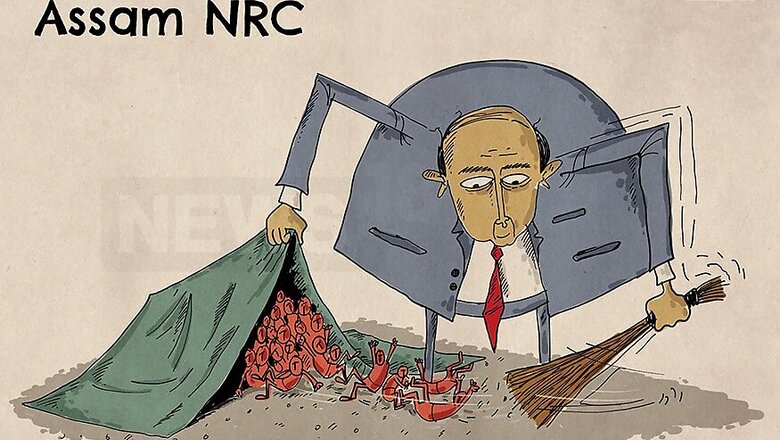Assam Man 'Declared Foreigner' 4 Years Ago Gets Another Notice to Prove Citizenship, Appear in Court

views
Guwahati: At a time when the Assam government has "rejected" the final National Register of Citizens (NRC) calling it a "faulty document", instances of harassment by border police in the name of detection of "foreigners" have come to the fore yet again.
Ali Akbar, a "declared foreigner" from Assam's Bongaigaon district, does not wish to return to the detention camp again – he was recently released from the Goalpara detention centre after a "traumatic" ordeal lasting four years. But in bizarre ways, the Foreigners' Tribunal (FT) in Bongaigaon has once again sent him a notice, tagging him as a "suspected foreigner" this time. In a notice served on November 20, Akbar has been asked to appear before the No. 2 Abhayapuri tribunal court on December 10 to prove his citizenship.
"I have endured a harrowing and traumatic ordeal for four years after they declared me a foreigner, and now they have sent another notice asking me to appear in court. I was released last month on a bail bond of Rs 1 lakh and two sureties. I don't have any money left to go through this all over again," said the 59-year-old.
Hailing from Bhatipara Char in Bongaigaon district, Akbar, who used to be a daily-wage earner, opened up about his time at the detention camp. The tribunal on December 31, 2015, had declared Akbar a foreigner reportedly for a mistake in his name on the paper documents. He was taken into custody by the border police and sent to Goalpara detention camp.
"We got two meals a day after a gap of six to seven hours. It was a vegetarian meal and once they served fish. I was given a piece as well," he said.
Akbar and six other inmates of detention centres in Kokrajhar and Goalpara were released on November 21 – the seven "declared foreigners", including a woman, were released as part of the May 10 Supreme Court order that states that detenues who have completed more than three years may be conditionally released.
The conditions include execution of a bond with two sureties of Rs 1 lakh each, submission of verifiable address of stay after release, biometric of the iris (if possible), and capturing all 10 fingerprints and photos to be stored in a secured database before release from the detention centres.
Besides, the person has to report once a week to the police station specified, and notify any change of his or her address there on the same day. A quarterly report will be submitted by the Superintendent of Police (Border) to the Home and Political Department regarding the appearance of such released declared foreigners to the police station concerned.
Little did Akbar’s family members know that their happiness was short-lived — the foreigners' tribunal notice on November 29 has left them shocked. Akbar's two sons are daily-wage labourers and somehow manage to fend for the family.
"I left my wife, two sons and a daughter at home when I was taken to the detention camp. My daughter got married and I now have a grandchild. My sons are cart-pullers. I will not be able to work again – my time at the detention camp has severely affected my health," said Akbar, complaining about the lack of healthcare facility at the camp.
Akbar believes he was wronged by a system that indicted him as a foreigner; finding no other way, he has appealed for help and financial assistance.
“I have all the documents – I submitted my father's voters list of 1966 and 1970, and the land patta as well. Would I get any help? I can't afford a lawyer," he said.
Official figures till July 9 stated the presence of 1,145 "declared foreigners" by 100 foreigners' tribunals in six detention camps of Assam. Although a few got relief from the Supreme Court upon challenging the verdict, many others yearn for freedom.
Amnesty International India recently urged the Assam government to review the way foreigners' tribunals function in the state. According to the NGO's latest report ‘Designed to Exclude’, these Tribunals have been enabled by the Supreme Court and the Gauhati High Court to create a statelessness crisis in Assam.
“People appearing before the Foreigners' Tribunals are not afforded the fair trial protections and human rights guarantees that flow from Article 21 of the Indian Constitution, applicable to both citizens and foreigners. This lack of protection has also been endorsed by the Gauhati High Court through its judgments in various cases," said the report.
Amnesty's India head Aakar Patel alleged that Foreigners' Tribunals were often dismissive, used derogatory language, controlled their own procedures and applied them in arbitrary ways.
“The courts are complicit in peddling a narrative which is clearly not based on any facts. By labelling migration as a security threat and continuing to do so, the courts have created a system which is designed to exclude and wreck the lives of many in Assam," said Patel.
(With inputs from Upananda Sharma)



















Comments
0 comment